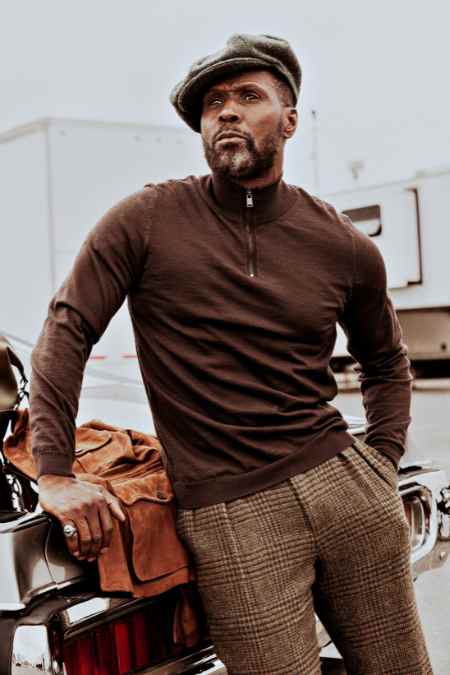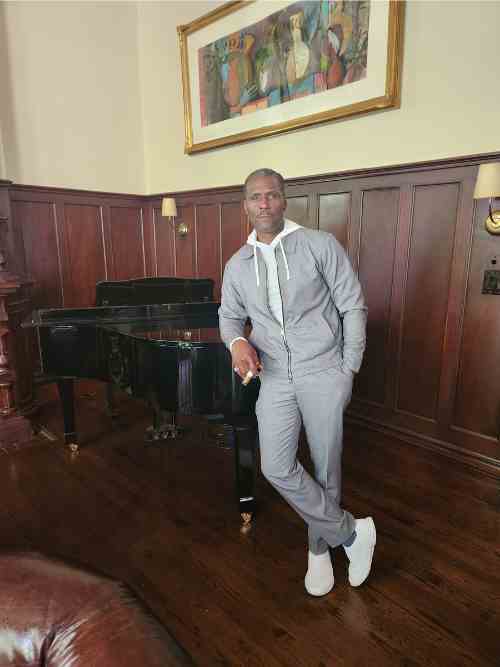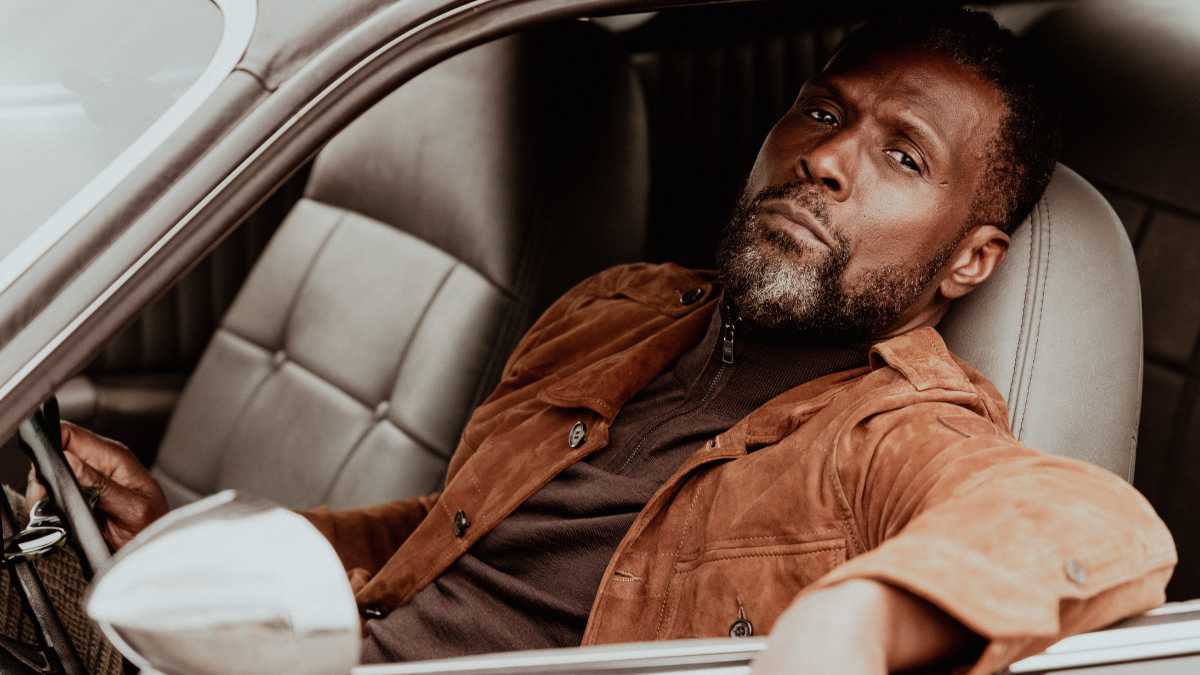Curtiss Cook of The Chi sheds light on his portrayal of Douda and how that prompted him to advocate for Black men’s mental health (Credit: Evgeny Milkovich).
Navigating the highs and lows of life is a collective experience, but how we handle the tough times defines us. Mental health struggles among Black men are an urgent matter that warrants open dialogue and attention.
In a recent interview with The Chicago Defender, actor Curtiss Cook shed light on his journey, mainly how life’s trials and his portrayal of “Douda” on-screen prompted him to advocate for Black men’s mental health. He emphasized the importance of seeking support and finding healthy coping mechanisms, even if it means something as simple as getting a furry companion.
Playing ‘Douda’ On ‘The Chi’

Curtiss Cook as Otis “Douda” Perry in ‘The Chi’ (Credit: Evgeny Milkovich).
Originally introduced as a recurring character in the Showtime original series “The Chi,” Otis “Douda” Perry has ascended from season 2 until now, and Cook expertly portrays this multifaceted character.
By day, Douda is a thriving businessman and a candidate for mayor. However, by night, he transforms into the formidable leader of the 63rd Street Mob. Douda is known for his ruthless determination to advance his agenda, exhibiting a cunning and dangerous nature that makes him a formidable adversary to anyone in his way.
“From an actor’s point of view, this a beautiful journey. I would almost say a Shakespearean because you really get to dive into a character and then not just show the surface level of a gangster or the surface level of a businessman but three dimensions of a character, which I enjoyed. So that’s the part as an actor,” he said.
“Describing the journey of portraying Douda across all seasons is like navigating through a complex and evolving character landscape. Initially, he appeared as a shrewd businessman, revealing layers of his persona with each episode. As an actor, this presented a thrilling challenge—to embody the duality of a man who seamlessly operated in both legitimate and criminal spheres.”
Curtiss Cook On Finding Bolo
Cook revealed how various life challenges, including losing his mother five years ago, becoming an empty nester and his connection to his character of “Douda,” led him to consider therapy once again.
Additionally, Cook acknowledged the complexities of diving deep into portraying a character.
He explained how immersing oneself in a character’s mindset can be challenging to shake off, affecting his well-being beyond the screen. This realization prompted him to explore additional coping mechanisms, including adopting a support dog, to navigate his career and personal life demands.
[perfectpullquote align=”full” bordertop=”false” cite=”” link=”” color=”” class=”” size=””]”I found myself in a place where I knew I needed to take action. So, I returned to therapy, opening up to my therapist about what I was experiencing. It wasn’t about suicidal thoughts but rather a profound sense of sadness and disinterest in daily activities,” Curtiss Cook said. [/perfectpullquote]
“Despite being on a successful show, I couldn’t shake the feeling of emptiness. My therapist suggested something that hadn’t crossed my mind before: a support companion. Initially skeptical, I brushed it off, but as time passed and my struggles persisted, I reconsidered. I stumbled upon an app called Pawrade, which led me to the idea of getting a pet. After some research, I realized a Doberman could be the perfect fit. Known for their loyalty and intuitive nature, I felt drawn to having a furry companion by my side.”
When Cook welcomed Bolo into his life, the pet brought a new sense of purpose and routine. From walks to playtime, caring for him became a shared responsibility that lifted his spirits. Bolo’s unwavering affection and ability to sense Cook’s emotions provided comfort during some of his gloomiest moments, he said. Two years later, Cook can confidently say that adopting Bolo was one of his best decisions.
His Support System
Support is needed within the Black community for the mental health of Black men. It starts with offering a healthy expression of love and respect and setting boundaries. It’s essential to understand that not every day will be perfect, but we can collectively foster a supportive environment by actively listening to each other’s perspectives and respecting individual decisions.
Cook shared that while his friends and family may not directly approach him about his well-being, they pick up on cues, such as when he is smoking a cigar alone and reflecting. Even his castmates on the show may take notice and respect his need for space in those moments, allowing him to chill and process without intrusion.
“It’s interesting because no one has ever directly approached me to say, “Hey, I’m glad you’re doing well,” or anything like that. When we’re together, it just feels like business as usual. But some people might notice subtle changes or differences in me over time,” he said.
“Around season five, going into six, I started withdrawing a bit more. The dynamics on set were shifting, too, with different groups forming and new cast members joining. It sometimes made it harder to connect with everyone, especially when schedules clashed. I hope they understand that my intention was not to be rude or disrespectful. Whenever I needed a break, I’d find a quiet spot, maybe go outside with my cigar, to gather myself. While I can’t speak for them, they understood and respected my need for space during those times.
How He Unwinds

Curtiss Cook unwinds. (Credit: Marshelle Sanders).
Cook also enjoys smoking cigars and can often be found at Biggs Mansion in Chicago’s Gold Coast neighborhood. The establishment is renowned for its exceptional cigar shop, lounge and inviting outdoor patio.
What does he like about being a member of this historic Cigar club? It matches his vibe.
“This place has three floors. There’s a pool room upstairs and a nice lounge area with a bar, chairs and tables. It’s a real community vibe here. Coming from New York, I was looking for like-minded people who enjoy smoking. I started by standing near the street with a smoke, but I didn’t want to bother anyone passing by. Then, I stumbled upon this place. Before becoming a member, they allowed anyone to sit in these seats. So, I thought, “Okay, I’ll try it.”
Once a member, Cook started meeting other people who were members, and it’s been excellent. It’s a laid-back atmosphere.
“The energy here resonates with me, and it’s helped elevate my style. I’ve always had an upscale vibe, and this place fits perfectly. I enjoy dressing casually yet stylishly, especially after the pandemic when everyone’s embracing that chill vibe. What I appreciate about this space is the energy it exudes. It feels like a place that’s ours, where Black men can feel comfortable and prestigious simultaneously,” he said.
At 57, Cook also prioritizes regular exercise. He believes in clear communication and setting boundaries and has recently taken up golfing, although he is taking a break due to a back injury. Additionally, he pays close attention to his diet.
Cook to Black Men: Talk About Your Pain
Upon recognizing his own need for therapy and support, Cook aims to empower other Black men to navigate their mental health challenges with resilience and to confront their issues constructively.
“I realized following all of that, pain, sadness, frustration, loss, all that does is wait for an emotional explosion to happen, eventually going off. So, I feel like we should start to openly recognize and say It’s okay to be upset, It’s okay to be sad, It’s okay to shed a tear. It’s okay to cry. It’s okay not to be right and not to want to do it. It’s okay to be like, ‘You know what? I know I’m supposed to be handling this situation right now, but you know what? I need a break for a minute because I need to sit back. I feel like I’m overextending myself.'”
Even when dealing with relationship issues, Cook expressed the importance of learning and growing from the experience when things don’t work out.
“I feel that all of us, especially Black men, should not be afraid of saying, ‘I am hurting right now, but I am going to be alright. I’m going to pass this. I don’t know when, but I will get past it.’ Take a break. Think about what you want to do. And that’s all it is: figuring out what’s right for you when directing your course.”
Black Men, You Can Do This!
People grow at their own pace; some need more time than others. Learning to deal with people while trying not to get hurt in the process—it’s all part of the journey.
Cook extends this counsel to his fellow brothers, encouraging them to pursue assistance and embark on their new journey with the support of reliable guidance.
[perfectpullquote align=”full” bordertop=”false” cite=”” link=”” color=”” class=”” size=””]”Try to find help. Finding the right therapist is one of the safest places to start, even though it can be stressful at first. It’s like building a relationship; for me, sometimes the art of acting becomes therapeutic. I love unraveling my path, like taking up a new hobby, even if I know I won’t be great at it immediately,” he said. [/perfectpullquote]
“Finding a therapist you can communicate with and trust creates a safe space to share without fear of judgment. Once you start getting it all out, you might feel like the problem still needs to be solved or fixed, but those baby steps count. You’ve released a little bit, and that’s progress. Then, the real work begins again.”
Season 6, Part 2 of “The Chi” is now streaming on Paramount+ With Showtime.




